About the OFJ
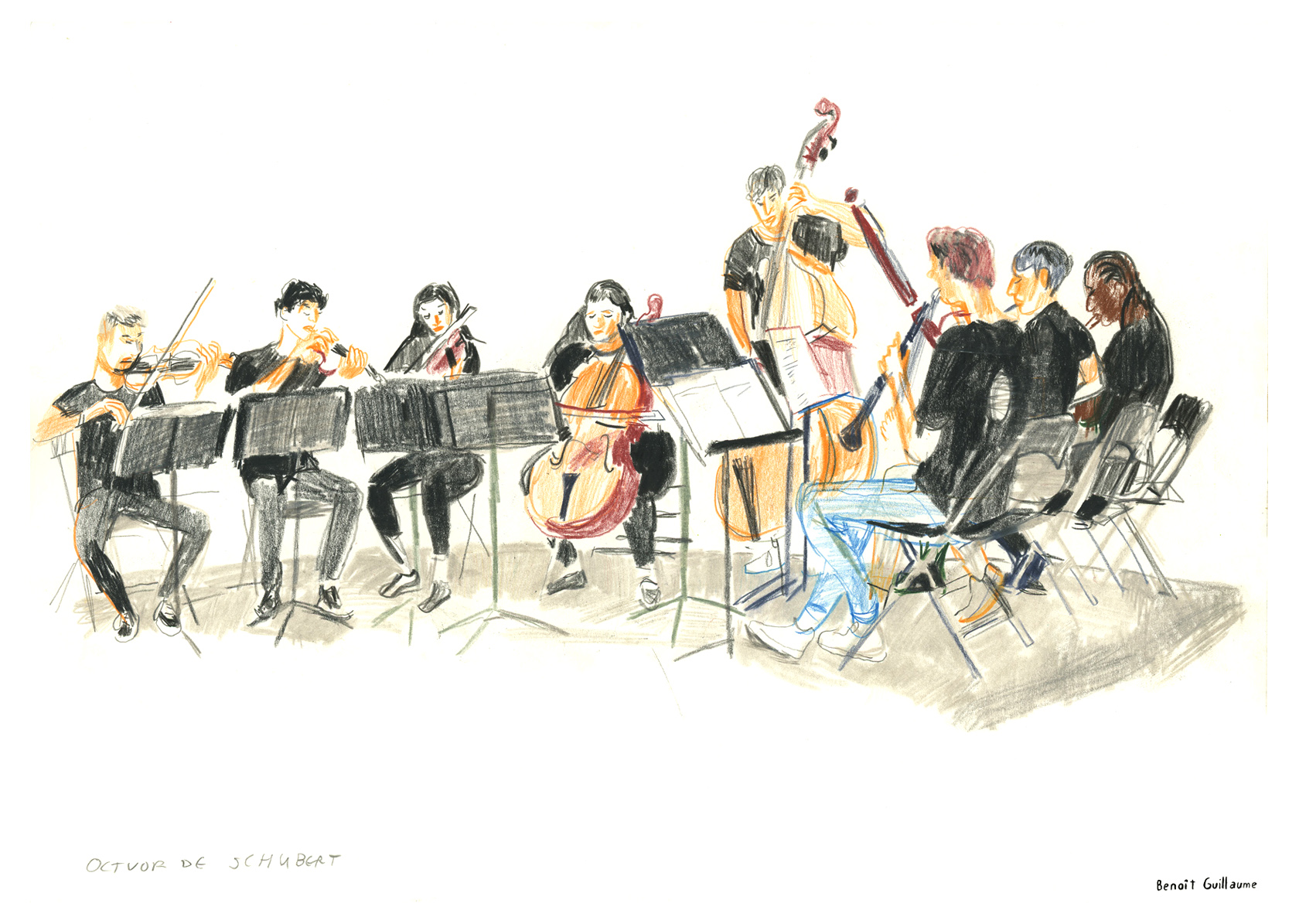
Founded in 1982 as a French Ministry of Culture initiative, the National Youth Orchestra of France (OFJ) trains young musicians from all over France in the orchestral professions. It picks out promising young artists, bringing them together in intensive sessions and giving them the opportunity to work with accomplished international conductors and world-famous soloists. The OFJ performs in France, at the Philharmonie de Paris, Lille and Dijon, and at leading festivals as well as abroad on summer tours. Every year, three sessions gather together around one hundred musicians from music academies. These sessions offer a chance to study emblematic orchestral works from the 18th century to the present day alongside seasoned professionals.
Background
Since it was set up in 1982, the OFJ has had plenty of adventures! Find out about the conductors, highlights and residencies that have marked the life of the orchestra.
1982
The orchestra’s 1st residency at the Saline Royale d’Arc-et-Senans
Musical Director Maurice Fleuret sets up an “orchestra school” to train young French instrumentalists in the profession of orchestra musician in response to demand from French orchestra communities that are struggling to recruit locally. The first orchestra conductor is Jérôme Kaltenbach, and the students are supervised by musicians from the Orchestre de Paris.
September 5th, 1st Parisian concert:
Great success in the Salle Pleyel!
1987
Greek and Israeli Tour
1989
The OFJ’s Indian Tour
with the Orchestre de Paris Choir
1993
Residency at the Opéra de Vichy
With its German and Italian counterparts, the OFJ creates the European Federation of National Youth Orchestras (EFNYO)
1995
On Marek Janowski’s initiative, a shorter interim session is launched, more similar to the rhythm of a professional orchestra
1996
15 YEARS!
1st concert at Amsterdam’s Concertgebouw to celebrate the orchestra’s 15th anniversary
1998
Polish Tour in collaboration with Polskie Radio
2000
1st concert at the Konzerthaus Berlin as part of the first edition of the Young Euro Classic Festival, set up on the initiative of the EFNYO
2001
Residency at the Auditorium de Dijon
2002
20 YEARS!
20 concerts in 24 hours, and 300 musicians on stage at the Auditorium de Dijon
2006
Creation of the OFJ Baroque
Up to 2018, its conductors have included Christophe Rousset, Paul Agnew, Leonardo Garcia Alarcon and Rinaldo Alessandrini
2007
Residency at the Grand Théâtre de Provence in Aix-en-Provence
2009
Kwamé Ryan conducts the OFJ performing Rachmaninov’s Symphony N° 2 for an audience of 30,000 at the Fête de l’Humanité!
The European programme Musxchange is set up
The Cultural Outreach training programme is launched
2012
30 YEARS!
Concerts at the Théâtre du Châtelet, Théâtre des Bouffes du Nord and Salle Pleyel
World première of Philip Glass’ Symphony N° 10
2017
Residency in the Hauts-de-France region
2018
Romanian Tour
2019
L’OFJ Baroque prend la forme d’une session consacrée au jeu et répertoire classiques
The OFJ organises the 1st edition of the CEREX (European Centre of Resources and Excellence), designed to train young European musicians in cultural outreach
2020
The OFJ is the first national orchestra to adopt an Eco-responsible Charter
2022
40 years!
World première of Suzanne Giraud’s “Liesse”
Anniversary concert at the Philharmonie de Paris
Romanian Tour
2023
Residency at the Saline Royale d’Arc-et-Senans and the Opéra de Dijon

Musical direction
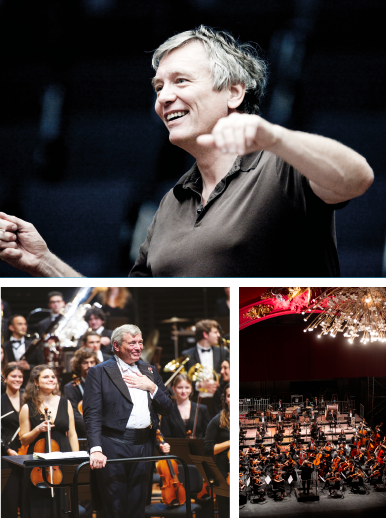
Michael Schønwandt
Musical director
From 2021 and until 2024, the Danish conductor Michael Schønwandt has been the orchestra’s Musical Director. Under his baton, the OFJ has performed at Berlin’s Young Euro Classic in 2023, as well as in Denmark, Romania, at the Philharmonie de Paris, the Nouveau Siècle in Lille, the Besancon Festival and so on.
Outside of his activity with the OFJ, Michael Schønwandt, born in Copenhagen, has a very active concert career and has worked with many of the world’s greatest orchestras (Berlin Philharmonic Orchestra, Vienna Philharmonic Orchestra, Royal Concertgebouw Orchestra, Vienna Symphony Orchestra, Vienna Radio Symphony Orchestra, Philharmonia Orchestra, London Philharmonic Orchestra, London Symphony Orchestra (including all the Beethoven piano concertos with Alfred Brendel),…). He is Principal Conductor of the Opéra Orchestre National de Montpellier. He was Music Director of the Royal Orchestra and the Royal Opera in Copenhagen from 2000 – 2011 and has been associated with the company since 1979. He was Chief Conductor of the Netherlands Radio Chamber Philharmonic Orchestra from September 2010 – Aug 2013. He has also held posts as Chief Conductor of the Berliner Sinfonie-Orchester, now the Konzerthausorchester, (1992-1998), Principal Guest Conductor of La Monnaie in Brussels (1984-87), Principal Guest Conductor of the Danish National Radio Symphony Orchestra (1987-2000), Principal Guest Conductor of the Royal Flanders Philharmonic Orchestra, and Principal Guest Conductor of the Staatstheater Stuttgart.
Michael Schønwandt has a special interest in Danish music. He is regarded as one of the leading exponents of Carl Nielsen’s music and has recorded all his symphonies and concertos and the opera Maskarade and Saul and David. He has also recorded the complete symphonies by Niels Gade and Weyse and his interest in contemporary music has led him to conduct many world premieres by Danish composers. Other world premieres include the Third Violin Concerto by Henze with the Berliner Sinfonie-Orchester, and, most recently, György Kurtág´s Concertante and Poul Ruders’ operas Dancer in the Dark and The Handmaid’s Tale for the Royal Opera in Copenhagen, released on CD to great critical acclaim.
Michael Schønwandt has made many notable recordings with the Danish National Radio Symphony Orchestra for Chandos, including Strauss’ Salome, released in 1999, and hailed by the Gramophone magazine as the best recording ever of the work. The DVD of the Copenhagen Ring has won many awards.
Recent and future operatic engagements include Lulu, Wozzeck, Cosi fan tutte, and Ariadne auf Naxos at Opera National de Paris, Elektra and Turandot at Opera de Montpellier, Wozzeck and Ariadne auf Naxos in Stuttgart, Falstaff at Covent Garden, La traviata for Wiener Staatsoper and Nielsen’s Saul and David for the Royal Theatre in Copenhagen.
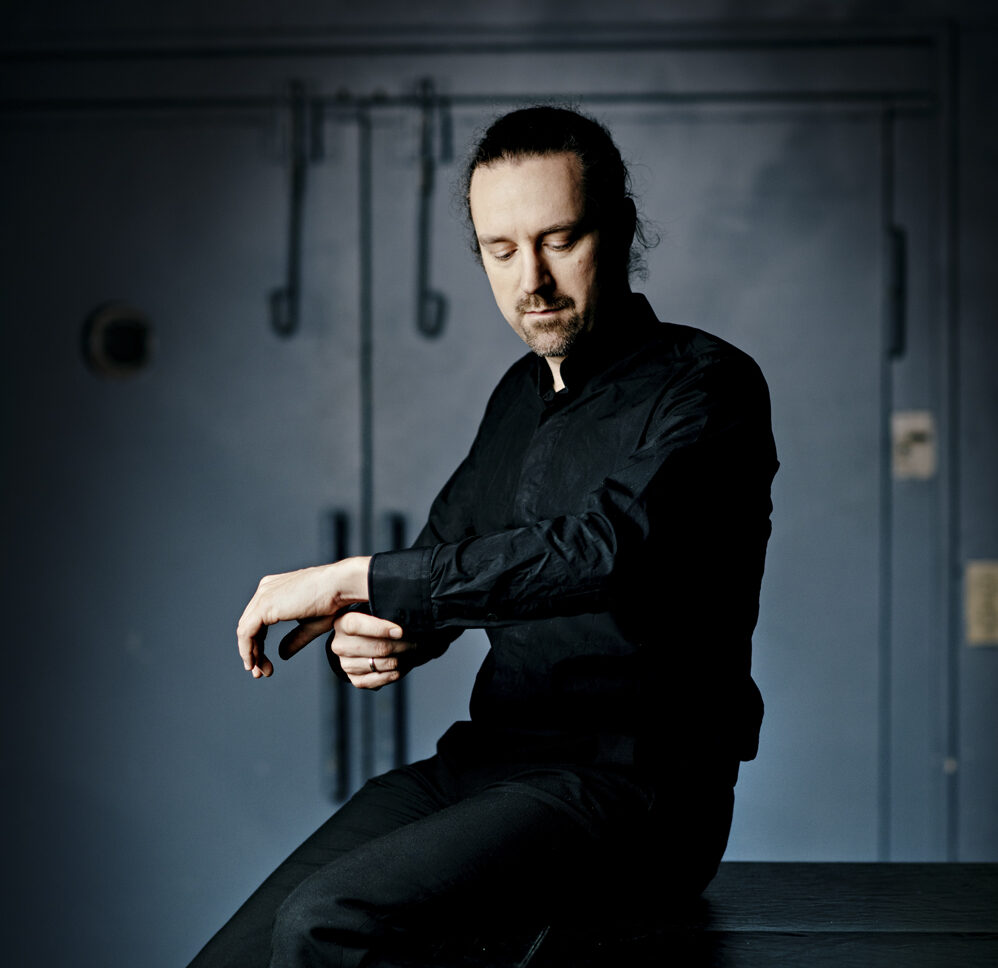
Julien Chauvin
Conductor of the classical session
Julien Chauvin was attracted at an early age by the Baroque revolution and the new wave of historically informed performance practice using period instruments and moved to the Netherlands to train at the Royal Conservatory of The Hague with Vera Beths, who founded L’Archibudelli with Anner Bylsma.
In 2003, he was a prizewinner at the International Early Music competition in Bruges. Since then he has performed as a soloist in South America, South Africa and Georgia, while at the same time playing in the leading European Baroque ensembles, before founding in 2005 Le Cercle de l’Harmonie, which he directed jointly with Jérémie Rhorer for ten years.
He has appeared as guest conductor with orchestras and ensembles including the Esterházy Hofkapelle, the Orchestre Régional d’Avignon-Provence, the Orchestre national de Metz, the Orchestre de Chambre de Paris, the Orchestre de l’Opéra de Limoges, the Orkiestra Historyczna of Katowice, the Folger Consort in Washington D.C., Les Violons du Roy, the Kammerorchester Basel and the Gürzenich-Orchester in Cologne.
In addition to his concert activities, Julien Chauvin also devotes himself to teaching in orchestral sessions or masterclasses at the Conservatoires Nationaux de Musique et de Danse of both Paris and Lyon, the École Normale de Paris, the Opéra national de Paris Academy and the Orchestre Français des Jeunes.
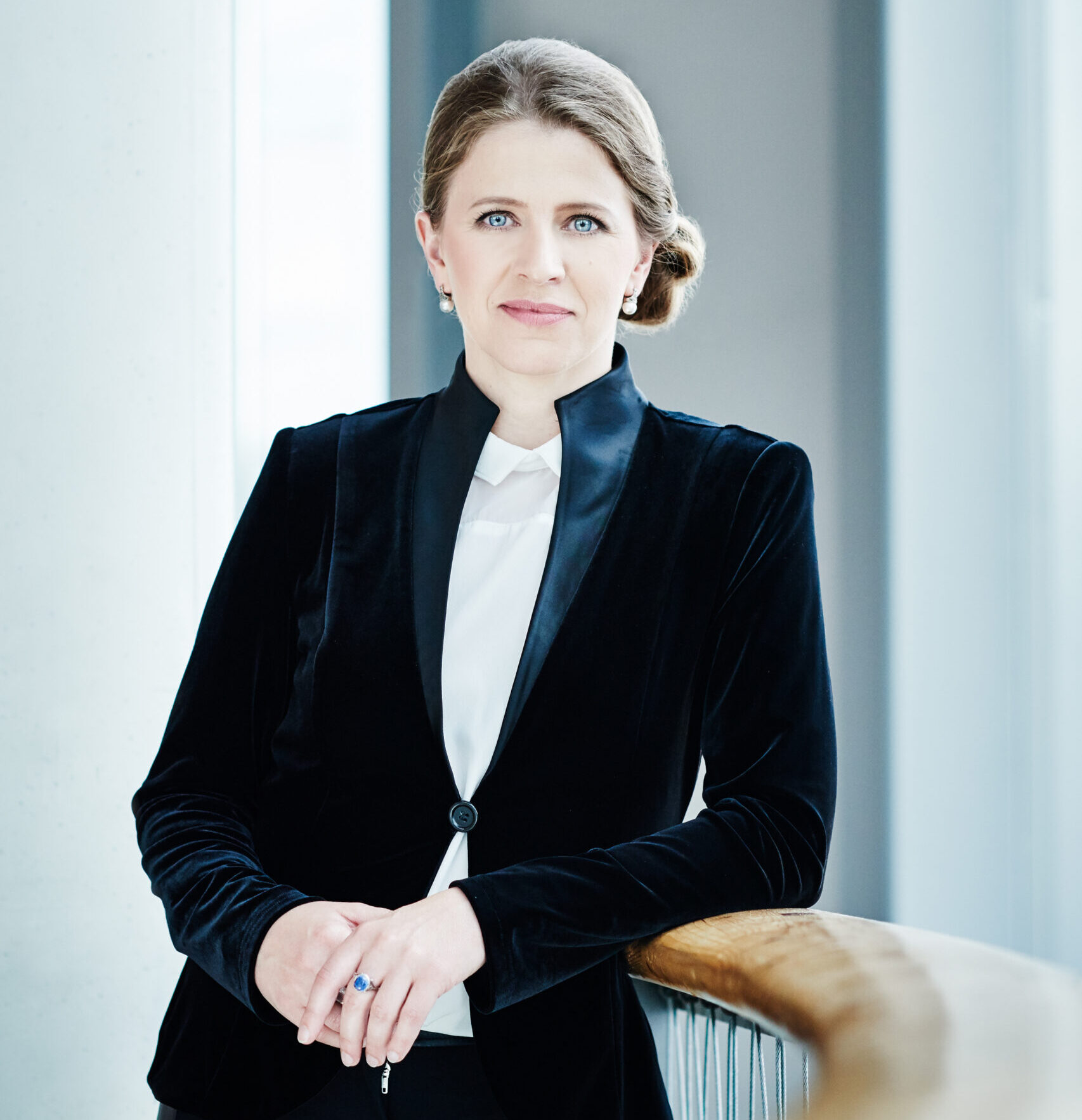
Kristiina Poska
Musical director (starting in 2025)
From summer 2025, Estonian conductor Kristiina Poska will be the new Musical Director of the OFJ.
Kristiina Poska, a brilliant conductor, is currently Musical Director of the Flanders Symphony Orchestra and Principal Guest Conductor at the Latvian National Symphony Orchestra. She has also been Musical director of the Theater Basel and Kapellmeister at the Komische Oper Berlin. She regularly works with orchestras all over the world including the BBC Scottish Symphony, the Royal Stockholm Philharmonic Orchestra, the Royal Concertgebouworkest, the hr-Sinfonieorchester, the Radio-Symphonieorchester Wien, the WDR Sinfonieorchester Köln, the Tonhalle-Orchester Zurich, the Minnesota Orchestra and the Oregon Symphony Orchestra, to name but a few. In France, she has directed the Orchestre National de France, the Orchestre du Capitole de Toulouse, the Orchestre Philharmonique de Strasbourg, and the Orchestre National de Metz, and this year, made her debut with the Orchestre Philharmonique de Radio-France.
Kristiina Poska’s nomination is part of the OFJ’s project to provide training of excellence in the symphonic repertoire, to keep pace with developments in the profession of orchestral musician, and to develop its international reputation.
Her commitment to younger generations, her passion for music of our time and her ability to unite orchestral musicians all correspond to the ambitions of the OFJ, a unique training facility in France recognised abroad for its very high standards.
“I am extremely proud and honoured to become the new musical director of the National Youth Orchestra of France and to follow in the footsteps of my magnificent predecessors. Over the last few years, I have worked regularly with young conductors. I find it particularly inspiring and gratifying to be so focused on the music we’re making, exploring it in depth together. I can’t wait to pass on my experience and knowledge to the next generation of French musicians, and to enjoy the outstanding setting of the Saline Royale d’Arc-et-Senans, the orchestra’s headquarters, and perform with them in some of Europe’s most prestigious halls.” Kristiina Poska
The musical directors of the OFJ symphony orchestra since 1982
1982-1983 Jérôme Kaltenbach / 1984-1997 & 2011-2003 Emmanuel Krivine
1986 Sylvain Cambreling / 1992-1997 Marek Janowski
1998-2000 & 2004 Jésus Lopez Cobos / 2005-2007 Jean-Claude Casadesus
2008 & 2011-2014 Dennis Russell Davies / 2009-2010 Kwamé Ryan
2015-2016 David Zinman / 2017-2020 Fabien Gabel
2021- Michael Schønwandt
The soloists
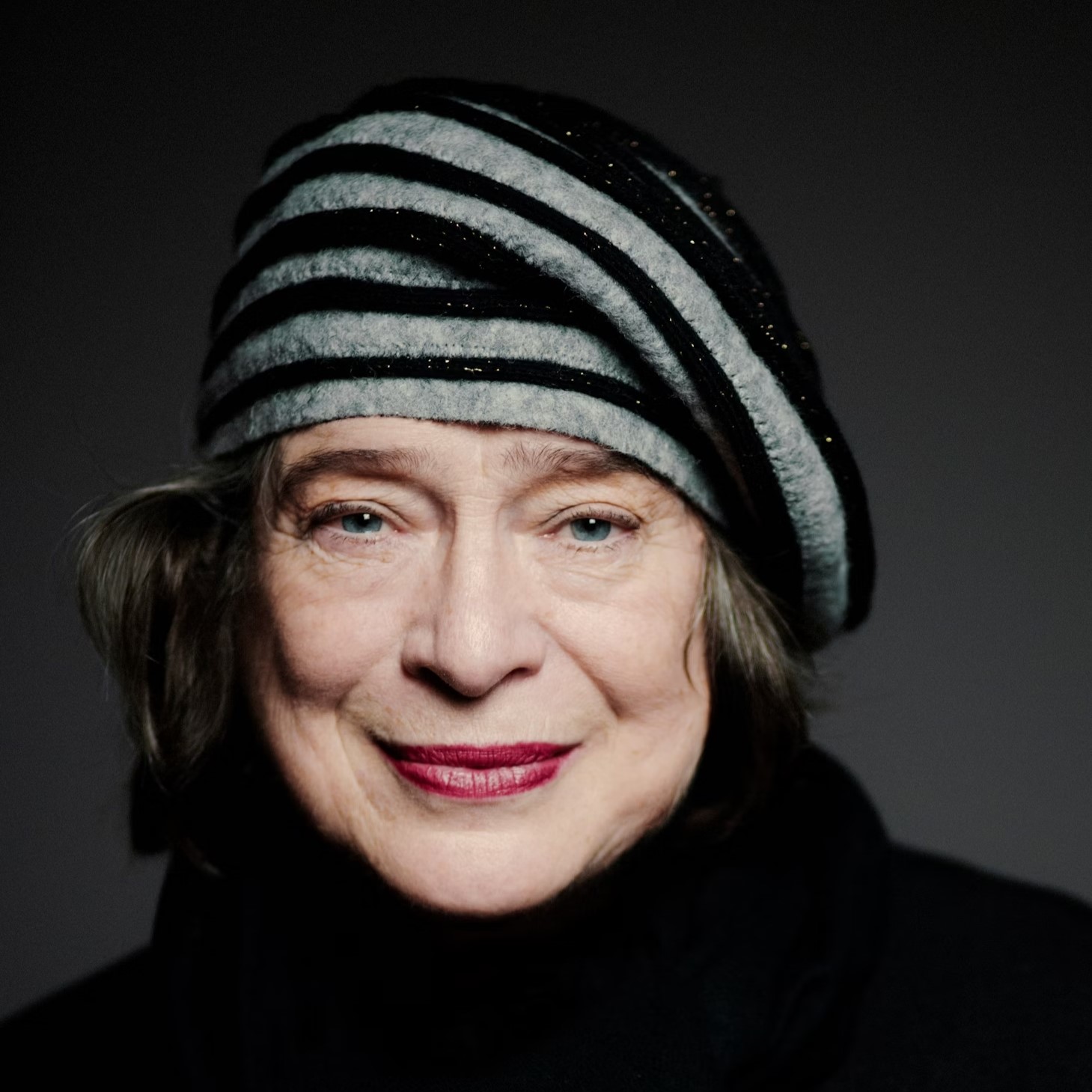
Elisabeth Leonskaja
Piano
Elisabeth Leonskaja, a pianist with a discreet personality and a unique touch and phrasing, nicknamed “The last great Lady of the Soviet School” or “The Lioness of the Keyboard,” embodies the Russian school of piano, having collaborated with the greatest conductors and musical ensembles worldwide. Recognized as a piano prodigy at a young age, she was enrolled at the age of 7 in one of the sixty music schools in Tbilisi. She gave her first concert at the age of 11, performing Beethoven’s Piano Concerto in C major, Op. 15. She began her studies in 1964 at the Moscow Conservatory, alongside Jacob Milstein, and won the Enesco Prize in Bucharest the same year, with the jury including, among others, Aram Khachaturian and Arthur Rubinstein. She also won the Marguerite Long-Jacques Thibaudcompetition in Paris and the Queen Elisabeth International Music Competition in Brussels.
Among her numerous collaborations with renowned musicians and conductors, she has worked with Kurt Masur, Sir Colin Davis, Christoph Eschenbach, Christoph von Dohnanyi, Kurt Sanderling, Maris Jansons, and Yuri Temirkanov. Elisabeth Leonskajamaintained a especially close friendship with pianist SviatoslavRichter, whom she even studied with and recorded Mozart sonatas transcribed by Grieg—a significant recording in her discography. This friendship and musical complicity, important to Leonskaja, lasted until Richter’s death in 1997.
Like several great musicians of her time, Elisabeth Leonskajaleft the Soviet Union in 1978 to escape the oppressive regime and settled in Austria, where she still resides. Shortly after her arrival in Austria, she participated in the 1979 Salzburg Festival, during which her Brahms, Chopin, and Schubert program confirmed to the European audience her career as a concert pianist. Concurrently, Elisabeth Leonskajashowed interest in chamber music, a predominant genre in her repertoire; she regularly collaborated with the Emerson, Borodin, and Artemis quartets. To this day, Elisabeth Leonskajacontinues global tours, participates in major festivals, and offers numerous masterclasses each year.
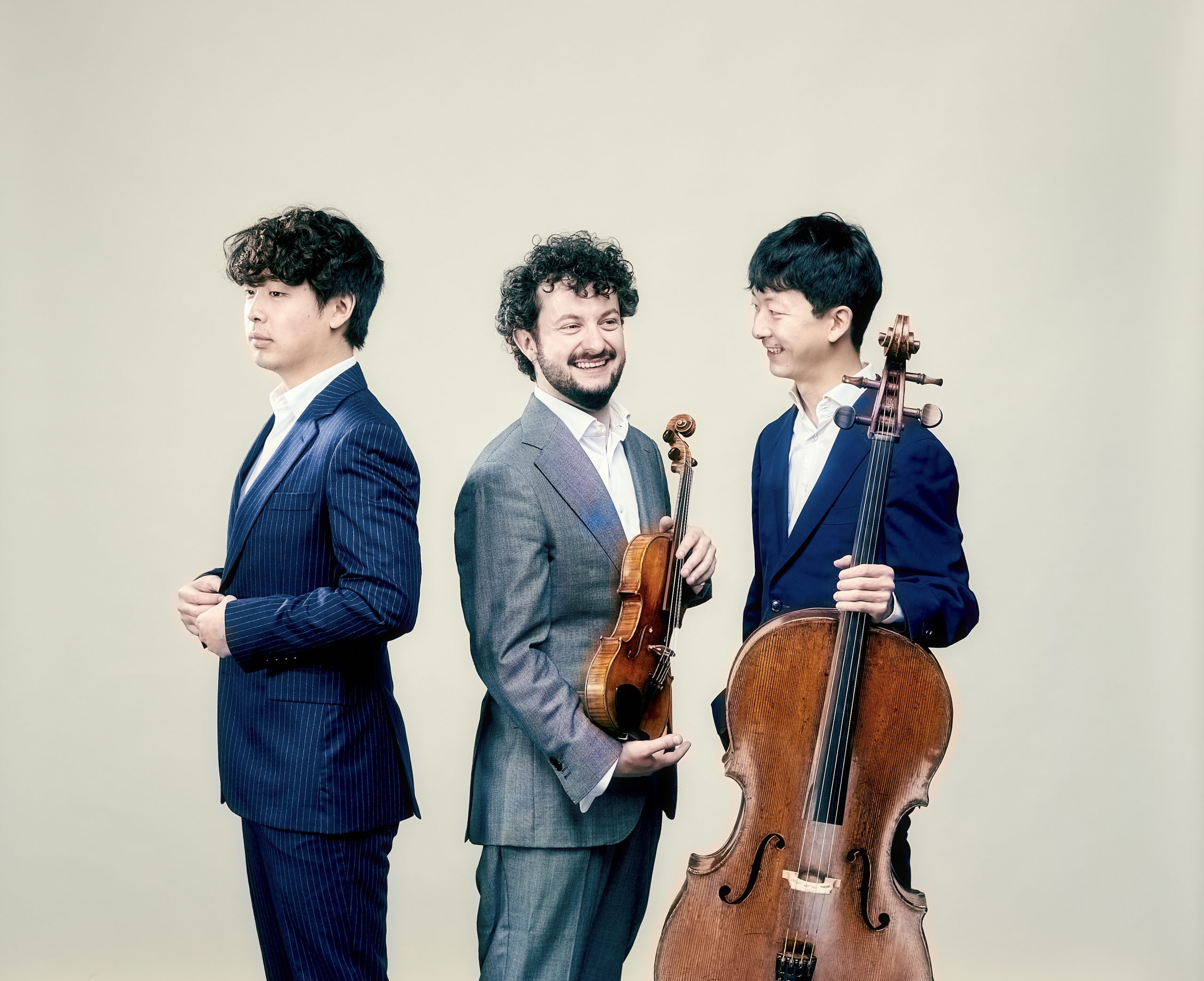
Trio Pantoum
Violin, cello and piano
Founded in 2016 at the Conservatoire National Supérieur de Paris, the Trio Pantoum has established itself in Europe and beyond as one of today’s leading young chamber ensembles.
Already winners of numerous major international awards (ARD Munich, Trio di Trieste, Joseph Haydn in Vienna, Osaka, Melbourne, Lyon, Joseph Joachim in Weimar, FNAPEC in Paris, etc.) and acclaimed in major concert halls on three continents (France, Italy, Belgium, Switzerland, England, Norway, Germany, Austria, etc., as well as Japan and Australia), Hugo Meder (violin), Bo-Geun Park (cello) and Kojiro Okada (piano) appear in numerous French and international media. Hugo Meder (violin), Bo-Geun Park (cello) and Kojiro Okada (piano) appear in numerous French and international media: ABC, The Strad, The Violin Channel, Rai 3, Ö1, SBS, Diapason,Bachtrack, Resmusica, France Musique, Archi Magazine, Télérama…
Quickly developing an exceptional complicity on stage and off, the trio has collaborated with artists such as Pierre Fouchenneret (violin), Miguel Da Silva and Paul Zientara (viola), Ann Lepage (clarinet), Aleksandra Dzenisenia (cymbalum), the Nerida Quartet…
They have studied with Patrick Jüdt, Hatto Beyerle, Johannes Meissl, Xavier Gagnepain, Miguel Da Silva, Corina Belcea, Claire Désert, François Salque, Günter Pichler, Antonio Meneses, members of the Trio Wanderer and the Quatuor Ébène… Trio Pantoum is Ensemble ECMA (European Chamber Music Academy), Resident at Proquartet-Centre Européen de Musique de Chambre, at the Fondation Singer-Polignac, at the Chapelle Musicale Reine Elisabeth (Belgium), and a Laureate of the Fondation d’Entreprise Banque Populaire.
In 2024, Trio Pantoum will record its first CD, make its debut in Beethoven’s Triple with the Orchestre Français des Jeunes, perform at the Philharmonie de Paris, the Festival Radio France Occitanie, the Festival de Pâques de Colmar, as well as touring Belgium, Germany, Austria, Switzerland and Italy… and taking part in Classeek’s “Ambassadeur” program.
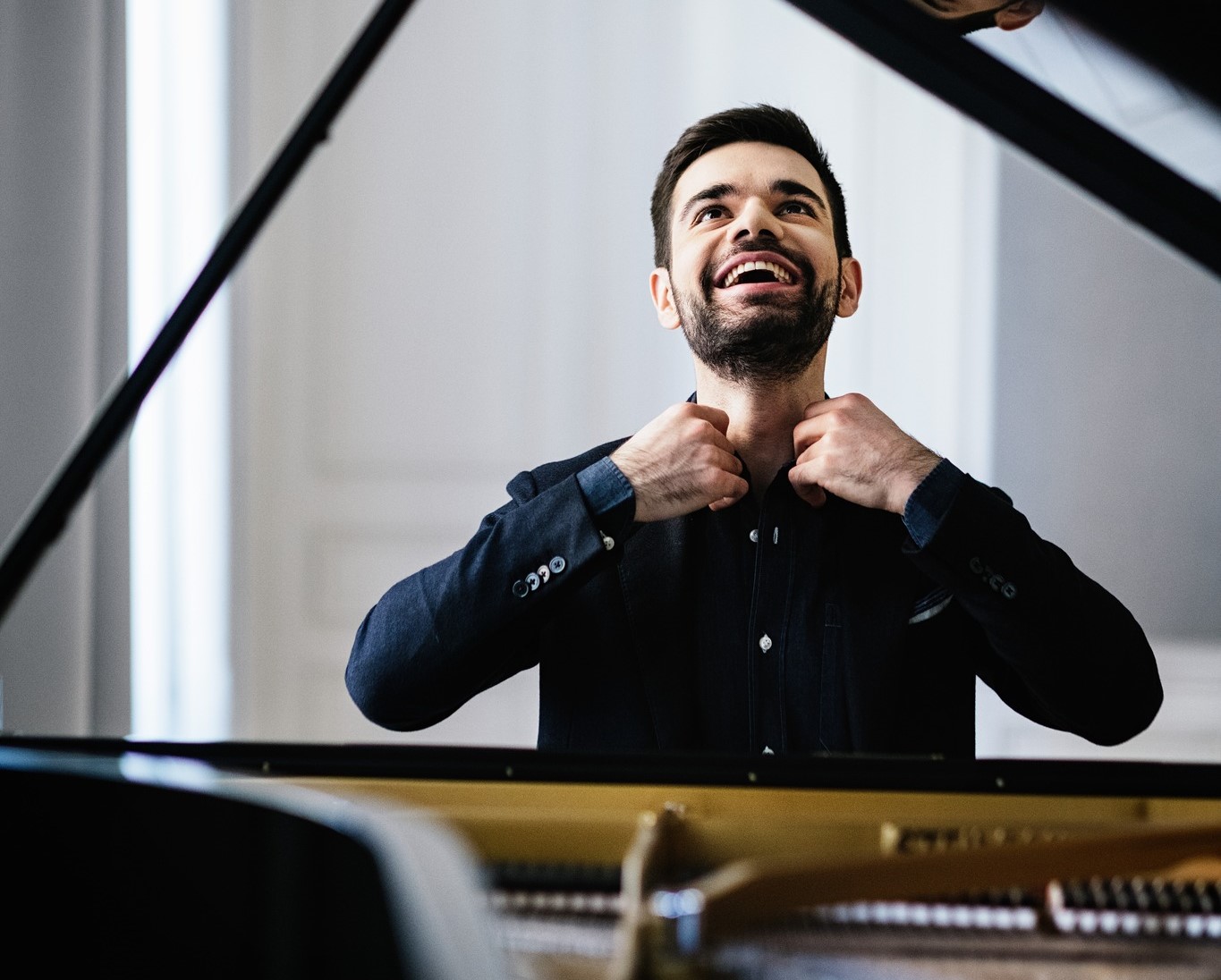
Jean-Paul Gasparian
Piano
Jean-Paul Gasparian, a virtuoso and precocious pianist, has already established himself as a recognized and sought-after artist at the age of 28, boasting a broad repertoire and winning numerous competitions with a wealth of experience.
In May 2023, he premiered Howard Shore’s piano concerto “Ruin and Memory” at Maison de la Radio, alongside the Philharmonic Orchestra of Radio France. In spring 2023, Jean-Paul released his fifth album, the first for the Naïve label. It is an entire album dedicated to Debussy, aligning itself “in the tradition of a Claudio Arrau” (Diapason). His previous recordings, dedicated to Rachmaninoff and Chopin, were enthusiastically received by the international press (“A Major Chopin Release” – International Piano Magazine, “A Highly Accomplished Chopinist” – BBC Music Magazine). In May 2022, Jean-Paul made his debut at the Philharmonie de Paris, performing as a soloist with the Orchestre National d’Ile-de-France. Jean-Paul was nominated for the 2021 Victoires de la musique classique in the category of Instrumental Soloist Revelation. In February 2020, he was awarded the Thierry-Scherz Prize at the Sommets Musicaux de Gstaad, leading to the recording of a CD with the Bern Symphony Orchestra for the Claves label, including Rachmaninoff’s Piano Concerto No. 2 and Arno Babadjanian’s Heroic Ballad (released in March 2022).
Jean-Paul has given recitals or performed with orchestras at the Philharmonie de Paris, Salle Gaveau, Fondation Louis Vuitton, and Auditorium de la Maison de la Radio, as well as at international venues such as the Tonhalle in Zurich, Laeiszhalle in Hamburg, and many others. Orchestras accompanying him as a soloist include the Orchestre Philharmonique de Radio-France, Orchestre National d’Ile-de-France, Nürnberger Symphoniker, among others. Since the summer of 2017, he has been recognized as a Steinway Artist.
Residency
Since the summer of 2023, the orchestra has been in residence in Bourgogne-Franche-Comté, at the Saline Royale d’Arc-et-Senans and the Opéra de Dijon. The August and autumn sessions are to be held in the Saline Royale (royal salt works), a UNESCO World Heritage site, its principal residence. The Opéra de Dijon will be hosting the winter session. This residency is accompanied by a number of projects and partnerships designed to bring the orchestra to the attention of all kinds of audiences, providing training in an essential aspect of the orchestral musician’s profession.
The OFJ and Europe
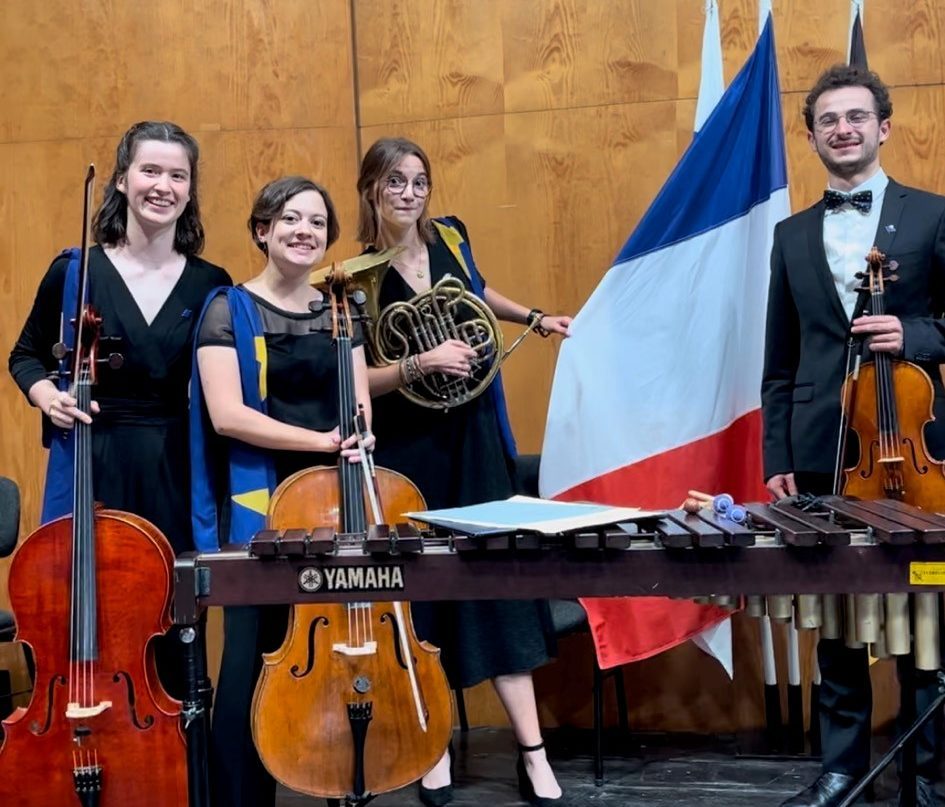
The OFJ’s European influence is essential: every year, the orchestra tours Europe, showcasing “French sound” and introducing young people to other professional cultures. In parallel, the OFJ is an active member of European projects for orchestral training: it participates in EUYO (European Union Youth Orchestra) auditions (taking responsibility for the first round of auditions), and is a member of the EFNYO, the network of European youth orchestras. In this capacity, it takes part in the musXchange project, which enables countries to offer immersive sessions in other youth orchestras (e.g. a Dutch trumpeter joined the OFJ for the summer session, while a French cellist is joining the JONDE, Spain’s youth orchestra, for one of its sessions).
Are you interested in the EUYO?
An Eco-responsible Orchestra
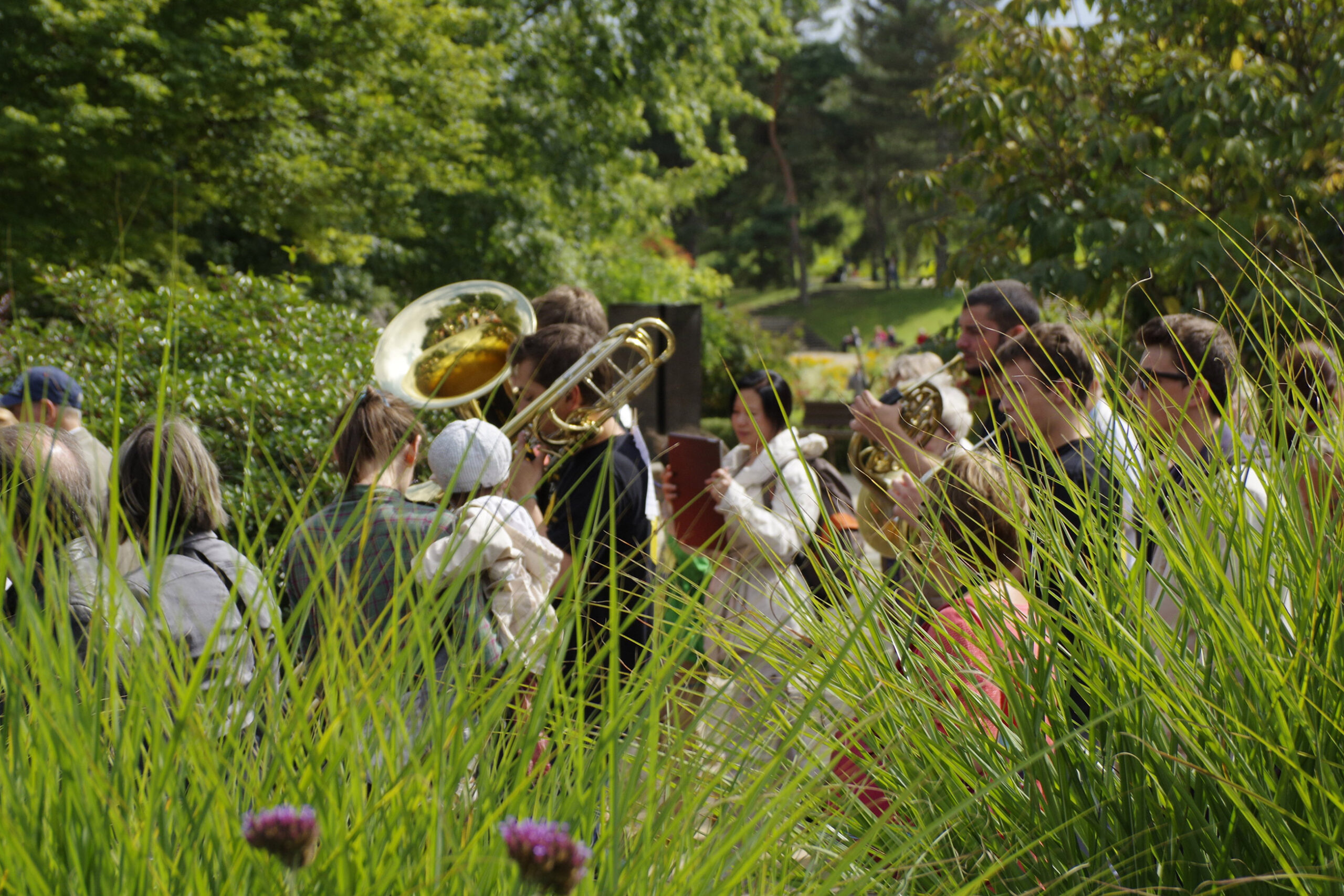
Back in 2020, the OFJ adopted an eco-responsible charter, which commits it to reducing waste, limiting air travel and encouraging short distribution channels for its catering. The orchestra is deeply committed to this approach: in 2023, one out of every two meals served to students is vegetarian, and the orchestra chose to travel by train and coach and did not fly on its annual tour.